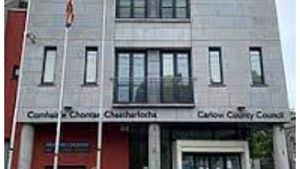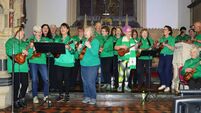New community safety partnerships by end of year

Carlow County Buildings
CARLOW County Council aims to have the new Local Community Safety Partnership (LCSP) in place by the end of the year.
The partnership will replace the Joint Policing Committee (JPC), with six meetings annually which will be open to the public, with councillors between them adapting safety plans for their areas, dealing not only with crime but other local issues.
Concerns have been raised by what’s seen as a delay in their establishment nationwide, while in Carlow the last JPC meeting was in April last year.
But at the September meeting of the county council, executive officer Barry Knowles updated councillors about the partnership.
Mr Knowles gave a detailed presentation to the members. He outlined the 2018 report by the Commission of the Future of Policing Ireland.
“The Department of Justice developed the new community safety policy based on a whole-of-government approach. A strategic partnership, requiring service providers and community to work together. This policy informed the policing, security and the , which commenced in April this year,” outlined Mr Knowles.
The Act enables the setting up of local and national infrastructure to support and enable this new approach, including the formation of such partnerships.
“The concept of community safety is about people being and feeling safe in their own community. Every community has the right to be and feel safe in order to thrive and flourish,” pointed out Mr Knowles.
A national strategy for a community safety framework and programme of actions must be in place by April of next year.
LCSP’s collaborative platform brings together relevant state services, community representatives and stakeholders to identify and prioritise local safety concerns, develop local safety plans and co-ordinate multi-agency responses.
“These will give communities a stronger voice in identifying, prioritising and addressing issues they face,” the executive officer noted.
A pilot scheme was run for three years in Dublin’s north inner city, Waterford and Longford and it was found that the LCSP had improved the identification and prioritisation of community safety issues that matter to the local community.
Mr Knowles continued: “LCSPs are designed to identify and prioritise issues of concern to communities while also developing a three-year local community safety plan. The structure of an LCSP involves residents, community including youth, new and minority communities and voluntary groups, business and educational organisations, service providers such as the gardaí, the HSE and Tusla. Also included are the council and political representatives, which are supported by a community safety co-ordinator.”
The approval and appointment of members to such a partnership is done by the minister for justice Jim O’Callaghan, while each partnership will be led by a voluntary chair.
The council will nominate seven councillors.
Council chief executive Coilín O’Reilly informed members at the meeting that it is aimed to have a partnership meeting “as soon as possible”. Mr O’Reilly also sought the election of the seven members to the partnership.
Councillor Michael Doran commented that the partnership was “long overdue” and welcomed the “broadening” of the group, which he believes will be “more effective”.
Cllr Ben Ward questioned whether there is a statutory obligation for certain groups to form the new partnership.
Cllr Paul Doogue noted that such a partnership “should not have to be waited on … community safety should be ongoing”.




